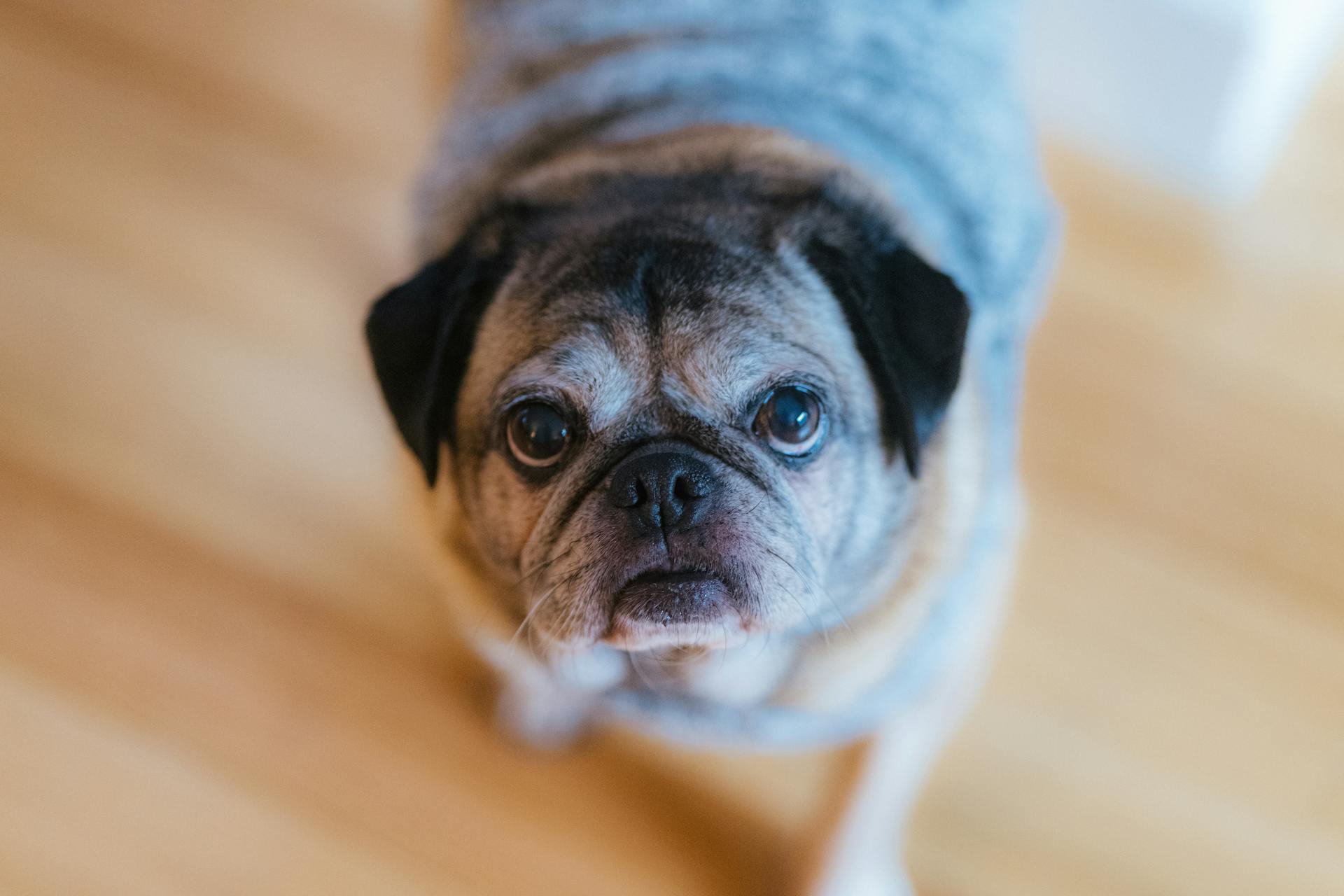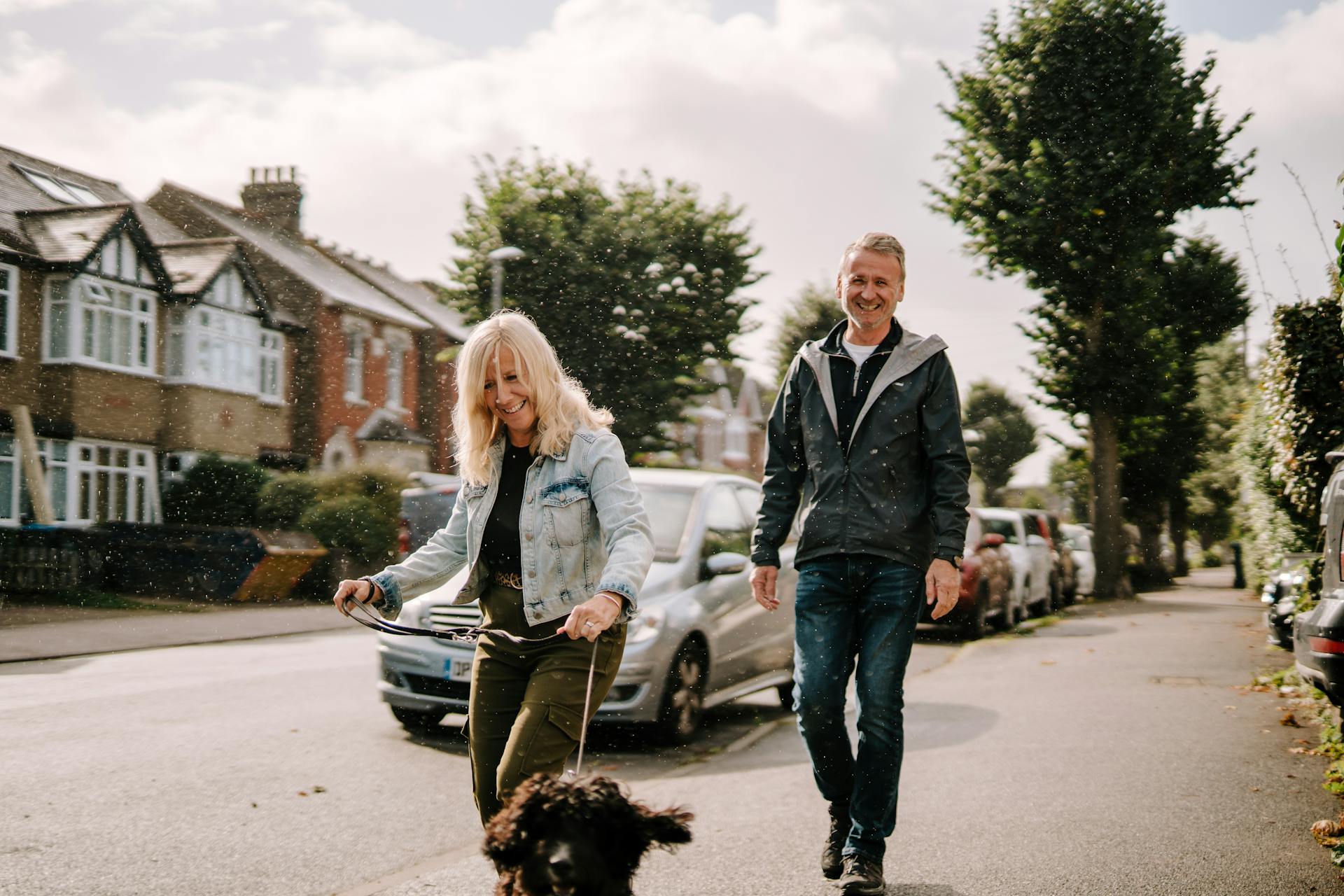
Dog dementia at night can be a challenging and worrying experience for pet owners. As dogs age, their brains undergo changes that can lead to cognitive decline, including memory loss and confusion.
At night, dogs with dementia may become restless, pacing back and forth in their beds or even trying to escape from their homes. This is often due to a disrupted circadian rhythm, which can cause them to feel anxious and disoriented.
One common symptom of dog dementia at night is vocalization, with dogs barking or whining excessively. This can be frustrating for owners, but it's essential to remember that the dog is not doing it to be annoying - they're simply trying to communicate their distress.
In some cases, dogs with dementia may become more clingy at night, seeking comfort and reassurance from their owners. This can be a sign that they're feeling anxious or scared, and may need extra attention and support.
Recommended read: How to Become a Dog Trainer for Service Dogs
What Is Canine Dementia
Canine dementia is a condition that affects a dog's cognitive abilities, causing changes in their behavior and daily life. It's a natural part of aging, and just like humans, dogs can experience a decline in cognitive function as they get older.
Dogs with dementia may exhibit disorientation, confusion, and anxiety, which can be distressing for both the dog and their owners. According to veterinary behaviorist Gary Landsberg, a DISHAA assessment can help evaluate six key areas of a dog's cognitive health.
The DISHAA assessment includes categories such as Disorientation, Interactions, Sleep cycles, House soiling, Activity and anxiety, and scoring is done on a scale of 0 to 3, where 0 indicates no signs and 3 indicates severe signs. A total score of 4-15 indicates mild canine dementia, 16-33 indicates moderate, and more than 33 indicates severe.
Some common signs of canine dementia include changes in awareness, such as confusion, disorientation, and staring into space. Dogs may also exhibit changes in sleep patterns, such as vocalizing at night, pacing, and restlessness, or increased sleepiness. These changes can disrupt the household and affect the dog's quality of life.
On a similar theme: What Are the Three Stages of Dog Dementia
A list of common signs of canine dementia includes:
- Disorientation/confusion
- Changes in behavior
- Anxiety/restlessness/Impaired memory
- Changes in sleep cycle
- General disorientation
- Failure to recognise family members or familiar places
- Forgetting commands and behaviours
- Going to the toilet inside
- Becoming withdrawn from owners
- Restlessness, pacing or excessive whining/barking
- Failing to respond when called
- Reluctance to move
These signs can vary in severity and may not be immediately noticeable, but by paying attention to changes in your dog's behavior and daily life, you can identify potential signs of canine dementia early on.
Diagnosing and Treating
Diagnosing dog dementia at night can be a complex process. Your veterinarian will need a thorough history of your dog's health, including the onset and nature of the symptoms and any incidents that might have caused unusual behaviors.
They'll perform a complete physical examination to evaluate your dog's overall health status and cognitive functions. Routine blood tests, thyroid testing, ultrasounds, and X-rays will also be used to rule out other diseases that may lead to behavioral changes associated with canine cognitive dysfunction syndrome.
Your veterinarian may recommend advanced imaging like an MRI or CT scan if necessary.
To treat dog dementia, maintaining a healthy and stimulating environment can help slow the progression of cognitive decline. This involves imposing a daily routine of exercise, play, and mental stimulation.
Worth a look: Should I Take My Dog's Collar off at Night?
A strict bedtime routine can also help minimize CCD symptoms. Night lights can help your senior dog navigate in the dark, making your home more accessible and safer.
Here are some ways to make your home more dog-friendly:
- Night lights can help your senior dog navigate in the dark.
- Potty pads near doors give your pup a place to go if they can’t make it until you come home or wake up.
- Orthopedic foam beds (with washable covers) can make sleep more comfortable.
Veterinarians Diagnose Dementia
To diagnose dementia in dogs, veterinarians need a thorough history of your dog's health, including the onset and nature of the symptoms. This will help identify any possible incidents that might have triggered unusual behaviors or complications.
Your veterinarian will then perform a complete physical examination to evaluate your dog's overall health status and cognitive functions. This examination is crucial in determining the extent of the cognitive impairment.
Routine blood tests, thyroid testing, ultrasounds, and X-rays are employed to rule out other diseases that may lead to behavioral changes associated with canine cognitive dysfunction syndrome. These tests help veterinarians identify underlying conditions that may be contributing to the symptoms.
Advanced imaging like an MRI or CT scan may also be recommended to further evaluate the brain and cognitive functions. This can provide valuable information for a more accurate diagnosis.
Treating

Treating your dog's dementia requires a multi-faceted approach. A healthy and stimulating environment can help slow the progression of cognitive decline. Maintaining a daily routine of exercise, play, and mental stimulation is essential.
Night lights can be a lifesaver for senior dogs, helping them navigate in the dark. Potty pads near doors give your pup a place to go if they can't make it until you come home or wake up. Orthopedic foam beds with washable covers can make sleep more comfortable.
A balanced diet can also play a crucial role in improving your dog's cognitive function. Prescription diets like Hills' b/d, Royal Canin's Mature Consult, and Purina Pro Plan's Neurocare are rich in antioxidants, vitamins, and minerals that support brain health. These diets typically contain ingredients like omega fatty acids, vitamin B, and E, which are excellent for improving cognitive functions.
In addition to diet, medication and behavioral therapy can be used to help keep your dog comfortable and active. Your veterinarian may recommend anti-anxiety medications like Anipryl (selegeline) if anxiety-related symptoms are a major factor in your dog's CCD. Regular check-ups with your veterinarian are essential to monitor your dog's response to therapy and adjust their care plan as needed.
A fresh viewpoint: Service and Therapy Dogs

Here are some common supplements that may benefit your dog:
- Omega fatty acids
- Melatonin
- Additional vitamin B
- S-adenosylmethionine (SAM-e)
Remember, every dog is different, and what works for one dog may not work for another. It's essential to work closely with your veterinarian to develop a personalized treatment plan for your furry friend.
Recognizing Symptoms
If you notice your dog is disoriented or confused, it may be a sign of dementia. Disorientation can manifest as difficulty navigating familiar environments.
Changes in behavior are another common symptom of dog dementia. This can include restlessness, anxiety, or excessive whining/barking.
Anxiety and restlessness can also lead to changes in sleep patterns. Your dog may vocalize at night, pace, or appear restless.
As dog dementia progresses, your dog may become withdrawn from owners. They may even fail to recognize family members or familiar places.
Here are some common symptoms of dog dementia to look out for:
- General disorientation
- Failure to recognise family members or familiar places
- Forgetting commands and behaviours
- Going to the toilet inside
- Becoming withdrawn from owners
Checking for Dementia
If you're worried about your dog showing signs of dementia, try doing a DISHAA assessment, as recommended by veterinary behaviorist Gary Landsberg. This quick questionnaire will help you evaluate six key areas of your dog's cognitive health.
Disorientation is a common sign of dementia in dogs, and it can manifest in different ways. Your dog may seem lost, get stuck in corners, or not recognize familiar people or places.
The DISHAA assessment includes a scoring system to help you evaluate the severity of your dog's symptoms. For disorientation, you can score 0 for no signs, 1 for mild signs, 2 for moderate signs, or 3 for severe signs.
Other areas to evaluate include interactions, sleep cycles, house soiling, and activity and anxiety. Changes in these areas can be indicative of dementia, and the assessment will help you identify the severity of your dog's symptoms.
Here's a summary of the DISHAA assessment categories and scoring system:
After completing the DISHAA assessment, you can interpret the results to determine the severity of your dog's dementia. A total score of 4-15 indicates mild canine dementia, 16-33 indicates moderate canine dementia, and more than 33 indicates severe canine dementia.
Frequently Asked Questions
How do you calm a dog with dementia at night?
Establish a consistent sleep schedule and daily routine to help reduce your dog's anxiety and confusion at night, making it easier for them to settle down. A predictable routine can be a calming influence for dogs with dementia, promoting a more peaceful night's sleep.
How do I know if my dog with dementia is suffering?
Changes in behavior, such as clinginess, withdrawal, or increased fearfulness, can be signs that your dog is struggling with dementia. If you notice these changes, it's essential to consult with your veterinarian to determine the best course of action for your dog's comfort and well-being
Sources
- https://www.petmd.com/dog/conditions/neurological/dog-dementia
- https://www.havenlakeanimalhospital.com/canine-cognitive-dysfunction-the.pml
- https://www.myfamilyvets.co.uk/signs-of-dementia-in-dogs
- https://www.dogster.com/ask-the-vet/dementia-in-dogs
- https://www.undertheweatherpet.com/blogs/under-the-weather/recognizing-the-signs-of-doggie-dementia
Featured Images: pexels.com


